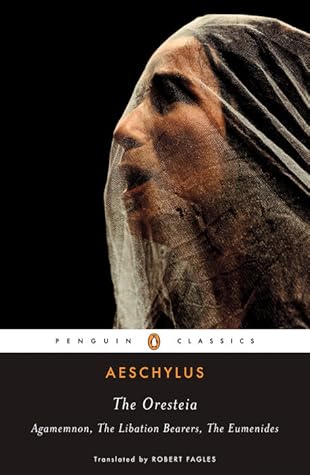More on this book
Community
Kindle Notes & Highlights
by
Aeschylus
Read between
February 9 - April 13, 2019
What Aeschylus builds upon the house of Atreus is ‘a grand parable of progress’, as Richmond Lattimore has described it, that celebrates our emergence from the darkness to the light, from the tribe to the aristocracy to the democratic state.
Aeschylus is optimistic, but he would agree with Hardy: ‘if way to the Better there be, it exacts a full look at the Worst.’
For the rites of Dionysus could include the rending of living creatures and feeding on their flesh; yet his rites were horrible and holy too, as Dodds suggests, and through them his communicants could absorb his vital gifts. He is the god who dies, the hunter who is hunted, the render who is rent - but all to be reborn.
Throughout the trilogy we may feel the sunrise breaking from the night or the seasons wheeling in their rounds, the winter yielding to the spring that leads again to harvest. Even more deeply, we may sense what the early tribe inferred from the making of the year: the making of a man, his rites of passage. Such rituals are ordeals, painful strides from loss to gain that mark a person at the crises of his life - puberty, marriage, death - and unite him with a larger set of values, his mate, his society, the ancestral dead.
The Oresteia is our rite of passage from savagery to civilization.
the Furies if, as legend tells, they sprang to life from the blood of Ouranos’ genitals when Kronos lopped and flung them in the sea. For the Furies are the spirits of the avenging dead that can also bring regeneration. They are the paradox of woman, Clytaemnestra first of all, murderous in defence of those she nurtures. They are the potency of creation, now consuming, now empowering, and so their transformation into the kind Eumenides may have been latent in their nature from the start.
Helen was captivating at first and then a Fury to the Trojans in their pride. And the moral of the story is a fundamental of early Greek ethics. In all prosperity there is a seed of insolence that matures and leads to ruin, or so the common man believes, oppressed by a sense of guilt for every kind of gain.
There is the sea and who will drain it dry? Precious as silver, inexhaustible, ever-new, it breeds the more we reap it - tides on tides of crimson dye our robes blood-red. The sea is both the reservoir of their riches and the incarnation of their never-ending strife, a harvest and a grisly reaping both.
Zeus tramples the bitter virgin grape for new wine and the welcome chill steals through the halls, at last the master moves among the shadows of his house, fulfilled. Zeus-Agamemnon has arrived to trample out the vintage where the grapes of wrath are stored. Agamemnon is teleios or fulfilled, ‘arrived at perfection’ and also ‘ripe for sacrifice’. Zeus is Teleios too, as we hear in the queen’s closing prayer, the lord of fulfilment who will consummate her rites.
phrase from the Odyssey, Agamemnon ‘cut down like an ox at the trough’, erupts into a kind of religious, mythological upheaval.
Apollo is oblivious to our origins; the Furies are our origins. Through them we may articulate ourselves, if we can bear to sing their song
‘she winds about him coil after coil of her glittering rhetoric’
It is what Eliot calls ‘the backward half-look/Over the shoulder towards the primitive terror’. It is chaos.
Atreus’ sons at Paris, all for a woman manned by many
eagles wheeled at the crossroads,
the pain of pain remembered comes again,
winds from the north pinned down our hulls at Aulis, port of anguish
And once he slipped his neck in the strap of Fate, his spirit veering black, impure, unholy, once he turned he stopped at nothing,
Justice turns the balance scales, sees that we suffer and we suffer and we learn.
And even if the men come back with no offence to the gods, the avenging dead may never rest -
you slung your net on the towers of Troy,
the giant dredge net of slavery,
she came to Troy with a dowry, death, strode through the gates
Who but a god can go through life unmarked?
She speaks well, but it takes no seer to know she only says what’s right.
ancient Violence longs to breed,
From proud halls crusted with gilt by filthy hands she turns her eyes to find the pure in spirit - spurning the wealth stamped counterfeit with praise, she steers all things towards their destined end.
When a man fails they share his grief, but the pain can never cut them to the quick. When a man succeeds they share his glory, torturing their faces into smiles. But the good shepherd knows his flock. When the eyes seem to brim with love and it is only unction, fawning, he will know, better than we can know.


